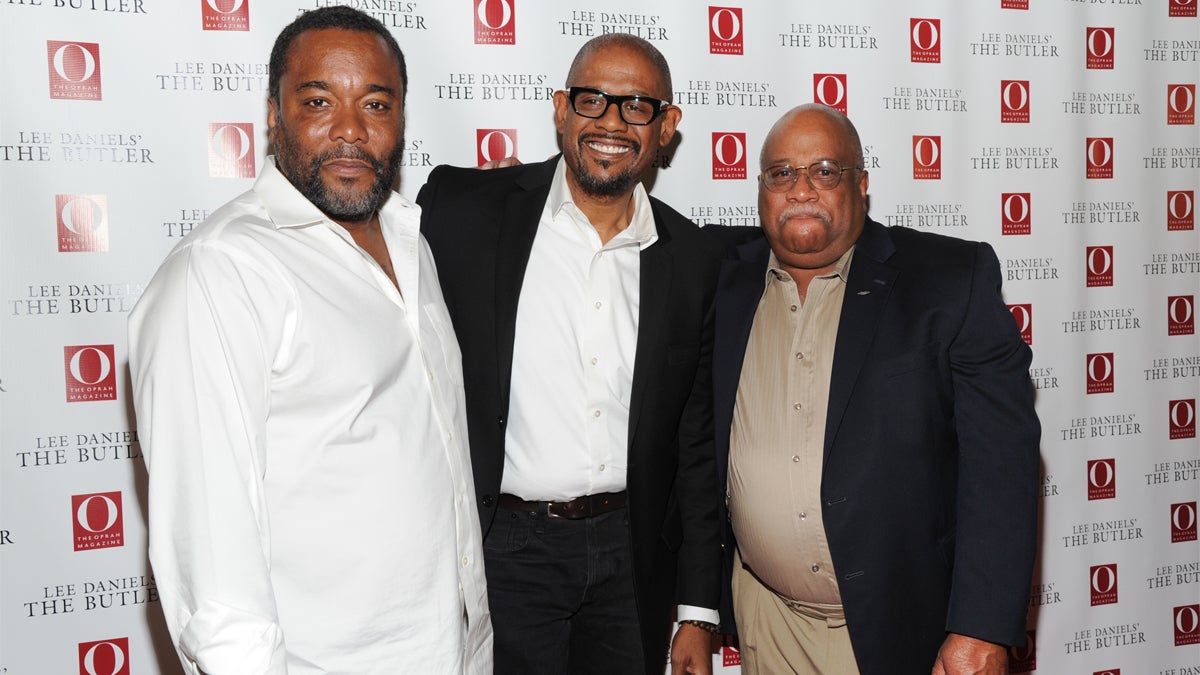Review: ‘The Butler’ is a portrait of a quiet witness to tumultuous history

Left to right, director Lee Daniels, actor Forest Whitaker, and Charles Allen, the son of Eugene Allen, at a screening of "Lee Daniels' The Butler." (Photo by Evan Agostini/Invision/AP)
“Lee Daniels’ The Butler,” a fictionalized version of White House butler Eugene Allen’s life, powerfully makes visible the invisible man. This story of conflict and reconciliation also makes visible something that is mostly invisible in American films: The African-American nuclear family.
When Eugene Allen entered the room, he strove to be invisible. Allen, an African-American, served eight presidents as a White House butler, from Harry Truman to George H. W. Bush. According to the new film inspired by his life, during his tenure at 1600 Pennsylvania Ave., he overheard Eisenhower tell Arkansas Gov. Faubus that integration was the law of the land, Johnson struggle to frame the Voting Rights Act, and Reagan refuse to impose sanctions on South Africa in the era of apartheid.
“Lee Daniels’ The Butler” is a fictionalized version of Allen’s life that casts Forest Whitaker in the title role as Cecil Gaines. The film powerfully makes visible this invisible man who wears one face on the job and another as the moderate father of a radical son during a politically polarized period of American history.
At the same time this story of conflict and reconciliation makes visible something that is mostly invisible in American films: The African-American nuclear family. This is far from the pathology of the black family in Daniels’ “Precious”. This is about the tensions and tenderness in a functional family. This is about how political beliefs can fracture a family and also bring it together.
“The Butler” electrifies with its generational struggle between Cecil, servant to power, and his son (David Oyelowo) fighting for black power. While watching Whitaker play the spousal scenes the domestic scenes with his wife (a fierce and funny Oprah Winfrey), and the paternal scenes with his son, David Oyelowo, it struck me that I hadn’t seen a film about a complex, functional black family in a while, maybe since 2007’s “This Christmas”.
But with the recent release of “Fruitvale Station” and the forthcoming “12 Years a Slave”, “The Butler” won’t be the only 2013 film about relationships in black families.
“The Butler” is at once the story of its hero’s three families: The broken one of origin, the intact one he builds with his wife that is broken by the struggles of the 1960s, and the larger American family, broken by racism and factionalism. As Cecil, Whitaker struggles to mend those breaks as he reconciles his two faces.
The panoramic screenplay, by Danny Strong, is like Forrest Gump with substance. Daniels introduces us to Cecil as a child, working with his sharecropper father in the cotton fields and forced to witnesses the land owner’s brutal treatment of his parents.
Young Cecil is taken into the home of the land owner’s mother and taught to serve. She tells him, “The room should be empty when you are in it.”
And so he becomes a master at staying in the background; polishing silver, pouring libations, appearing with a beverage or meal in a way that never intrudes or interrupts.
Before eight chief executives, in a White House that has much in common with the plantation manor where he perfected his skills, Cecil pours champagne into flutes and tea into china cups without spilling a drop. Likewise, his emotions never spill over. Yet one point of Daniels’ movie — and of Whitaker’s elegantly contained performance — is that Cecil fills up every room he enters. He fills it the way a supporting player fills the stage and unintentionally draws attention away from the lead.
The quality that makes Cecil ideal for his job is less welcome at home. His demonstrative wife (Oprah Winfrey) thinks he’s shut down and feels alone. His son, Louis (Oyelowo) is as vociferous in his political protests as his father is soft-spoken and accomodationist on the job.
Their generation gap widens into a chasm when Daniels intercuts scenes of Cecil graciously serving dignitaries at a White House dinner with those of Louis ungraciously bloodied for sitting at the whites-only area of a lunch counter. Louis is enraged by what he thinks is Cecil’s subservience. But when the young man joins Martin Luther King’s circle and the Civil Rights leader talks about blacks in service as subversives on the front lines of integration, Louis listens.
Yes, James Marsden plays JFK, Liev Schreiber LBJ, John Cusack Nixon and Alan Rickman Reagan. Presidents come and go, but the focus is Cecil and Louis and the conflict of whether it is nobler to wait for change or to go out and make it.
Just when you think you’re watching the story about a witness to history you see how, in his own way and in his own sphere, Cecil is an agent of change. You know it because at movie’s end, he wears the same face at the White House as in his own home.
The film opens in theaters on Aug. 16.
—
Carrie Rickey was the Philadelphia Inquirer film critic for 25 years. Follow her at @CarrieRickey and http://carrierickey.com.
WHYY is your source for fact-based, in-depth journalism and information. As a nonprofit organization, we rely on financial support from readers like you. Please give today.

